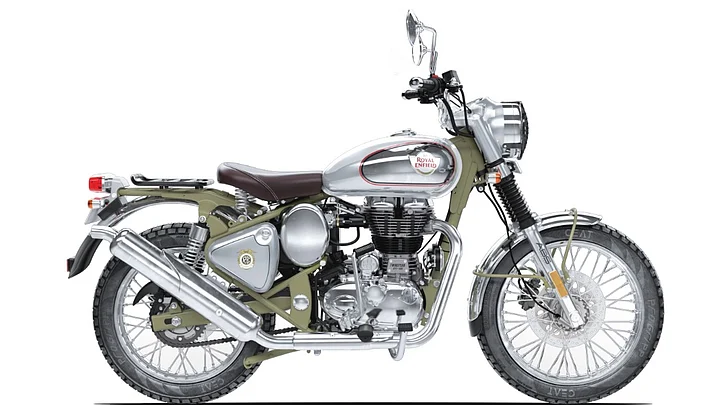Royal Enfield recently launched its niche scrambler-inspired iteration of the Bullet called the Royal Enfield Trials Works Replica. It comes in two engine sizes – a 500 cc variant priced at Rs 2.07 lakh and a 350 cc variant priced at Rs 1.62 lakh. Now what makes these bikes special? Well, it’s a tribute to the original custom-built Royal Enfield Trials built in 1949 – this being a more modern iteration.
To the untrained eye, these Trails bikes would be called “modified Bullet”. Well, that’s not really far off the mark, considering the Bullet is the brand’s longest-selling model, being in production since 1932. It’s also one of the most-modified bikes among bikers in India, from custom exhausts to seats and handlebars.
At the same time, Royal Enfield also has a proper adventure bike in its portfolio – the 411 cc Royal Enfield Himalayan. The Trials looks like a cross between the two.
So how is the Trials different? And how does it compare with the standard Bullet as well as the adventure-bike capabilities of the Himalayan? But first a bit of history.
The Back Story
Back in 1930s, the standard Royal Enfield Bullet was modified to compete in the 1935 International Six Days Trial (ISDT) – a competitive ride across challenging tracks – with the Royal Enfield team faring well. They won 37 trials titles trophies an six gold medals in the ISDT. It went on to stay a winner for close to 14 years, with some mods coming along the way, like the introduction of the swing-arm suspension.
“It was in fact the success of the Bullet Trials motorcycle over challenging terrains that caught the eye of the Indian Army. In 1952 when the Indian Army placed an order of 800 Bullet motorcycles to patrol the border regions of Kashmir and Rajasthan, which directly lead to the creation of Enfield India in 1955.”Mark Wells, Global Head - Product Strategy, Royal Enfield
The Bike
So what’s the modern Royal Enfield Trials like? Well, in a nutshell, it’s a modified Bullet chassis, that’s been beefed up to handle harsh terrain. Of course, the main selling point of this bike is its styling.
The Bullet is available in 500 cc and 350 cc versions in India, powered by the UCE (unitary construction engine) engine. It puts out 27 bhp of power and 41 Nm of torque in its 500 cc iteration and 19.8 bhp and 28 Nm of torque in 350 cc form, with 5-speed gearboxes.
The Bullet Trials come with tyres with a block tread pattern for improved off road grip, and a reinforced handlebar with cross-brace. The Trials also features a raised silencer for improved ground clearance in addition to being equipped with dual-channel ABS.
Giving it a bit more off-road cred are trimmed mudguards, a single seat and luggage carrier. Accessories such as a sump guard, engine guard and headlamp grille complete its “look”
How’s It Different?
If you’ve owned or ridden a Bullet 500 or Bullet 350, it’s not that different. The difference will be mainly cosmetic. The Bullet has a 1,370 mm wheelbase (which is about 10 mm less than the Classic series) and 135 mm of ground clearance. The Bullet 500 is priced at Rs 1.88 lakh.
To increase the clearance on the Trials, Royal Enfield has swept the exhaust upwards. And of course, there’s no way to carry a pillion, doing away with the need for pillion pegs or a saree guard!
Now, there’s also the Royal Enfield Himalayan which is a proper off-road bike. It comes with 220 mm of ground clearance, a 411 cc engine that puts out 24 bhp of power and 32 Nm of torque. The Himalayan is priced at Rs 1.80 lakh.
Given the pricing of the Trials, it will appeal to a niche audience that would otherwise pick up a standard Bullet and modify it. Now, with the law frowning on vehicle modifications, the Trials will appeal as a “legally modified Bullet” to that crowd.
(At The Quint, we question everything. Play an active role in shaping our journalism by becoming a member today.)
